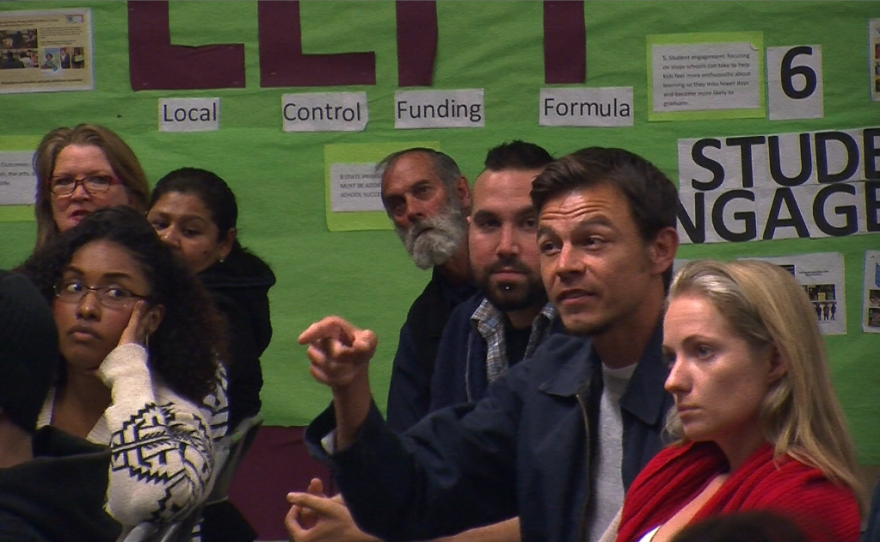The San Diego Police Department has come a long way since January, when then Chief William Lansdowne told KPBS and Voice of San Diego he wasn't aware of racial profiling concerns in the community. Now, new police Chief Shelley Zimmerman is hearing them firsthand at a series of town hall meetings, to which Lansdowne had committed before he retired.
About 200 residents attended each of two meetings in southeastern San Diego and City Heights this week. Borrowing a theme from the mayor who appointed her, Zimmerman stressed the need for unity in solving crime in neighborhoods and the department.
"It's all about working together with our police department — all the communities, one San Diego — to make San Diego, not only the safest city, but one where we have open dialogue with all of our communities," Zimmerman said.
An open dialogue is what Zimmerman got, with audience members asking for everything from increased traffic patrols and information on recent crimes to details on new and reworked policies to deter racial profiling and officer misconduct.
Here are a few takeaways from both meetings:
Zimmerman won't say racial profiling is happening.
But she will say the perception that officers stop people on the basis of race is out there and important to address.
"If there's even one person that has that perception in the community, then that's reality and we need to change that reality."
Her comments suggest police brass have turned a corner since KPBS and Voice of San Diego revealed the department had stopped enforcing its policy to collect racial data during traffic stops:
Lansdowne isn’t troubled by the decrease in the department’s data collection efforts. He and his top deputies said residents don’t believe racial profiling is a problem.
“It hasn’t come up in years and years and years in interactions with the community,” then-Assistant Chief Shelley Zimmerman said.
Expect to get more face time with police.
Zimmerman said the perception racial profiling is happening can be best addressed by officers discussing with community members their intent in stopping them. She said she's urging her officers to take the extra step.

But some in the audience took issue with the idea the department has only a perception problem.
"It sounds like what you're saying is you want to do a better job communicating why you were violating people's civil rights to them," said Josh Funn, a member of the group United Against Police Terror who was active in the Occupy movement. "It's not about perception. You're making it that. I can point out to you cops I've seen say racist things and be violent with people who have done nothing."
Others at both meetings quietly affirmed the frustration with Zimmerman's framing of the issue, but just as many said they were happy with her willingness to participate in a dialogue about it.
Zimmerman encouraged Funn to talk to one of the department's internal affairs representatives after the meeting.
The department is billing its federal review as a premier solution. Not everyone is buying it.
At both meetings, a member of the audience asked Zimmerman why the department refused a federal monitor.
A quick explanation: Two types of external reviews have been on the table as the department struggles through continued misconduct allegations.
One is a federal monitor — a watchdog imposed by the Justice Department to oversee internal complaints and address all kinds of inappropriate behavior by officers. One of the victims of former officer Anthony Arevalos is asking a judge to make that happen as part of her lawsuit against the city.
The other option is a voluntary review by Justice Department researchers. The police department would be free to implement recommendations issued as part of the review — or to ignore them. SDPD has chosen this option because, well, it's the only one you can actually choose.
But Zimmerman didn't mention the call for an involuntary federal monitor at either meeting.
"We are welcoming this assessment — this thorough, independent, critical assessment," Zimmerman said, referring to the six-month review the department applied for and was granted Monday.
But the fact that at least one audience member brought up the federal monitor in each session means there’s some doubt swirling about the efficacy of a voluntary assessment. And Zimmerman’s response didn’t acknowledge that the department could face a mandatory watchdog.
Civil rights groups in Las Vegas had similar complaints when its police department underwent the same voluntary review program in 2012. The DOJ reported leaders there quickly began making changes based on its findings.

Community members are skeptical of the cop cams solution.
There were multiple questions at both meetings about whether police officers would be in charge of the record button on their body cameras.
Zimmerman said the department is looking at best practices in other departments but will likely require the officers to manually flip their cameras on when they initiate an enforcement stop.
When pressed by a southeastern San Diego resident to explain how the community could trust the officers are using the technology, Zimmerman said she'll make them or take appropriate disciplinary measures if they don't.
A lot of people like the police.
Audience members peppered both meetings with compliments submitted on note cards. One from southeastern San Diego:
"I'm a 45-year-old African-American man. I want to thank the San Diego Police Department for treating me with respect throughout my 24 years in San Diego. I do, indeed feel safe."
We didn't get the full picture of those who don't like them so much.
Paul Khalid Alexander of Pillars of the Community, a community nonprofit in Encanto, said he was disappointed to see few Latinos and Filipinos at the meeting in southeastern San Diego. He said both groups also experience racial discrimination but unifying ethnic and racial groups is an ongoing challenge in his neighborhood.
Zimmerman will get the chance to hear more perspectives in the coming weeks. She plans to visit every City Council district.








